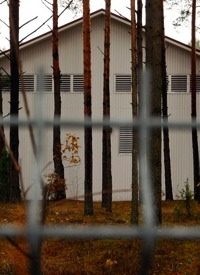
A Lithuanian Seimas investigating committee has concluded that he Soviet-era holdover “Committee for State Security” spy agency had struck a deal with the CIA in 2002 to create secret “black site” prisons in Lithuania to interrogate terrorist suspects outside of U.S. legal restraints. But the parliamentary committee was unable to confirm that actual interrogations and torture had taken place. Upon accepting the conclusions of the Seimas (parliament) investigation, Lithuanian Prime Minister Andrius Kubilius said that the United States had manipulated Lithuanian officials with "essentially Soviet methods."
The prisons included a small site designed to house a single prisoner as well as an elaborate and larger facility at a former elite stable where as many eight prisoners could be housed. The existence of the larger facility was revealed to the public in November by ABC News. Arvydas Anusauskas, chairman of Lithuanian Seimas’ national security committee, explained that while he could find no hard evidence of torture taking place at the sites, the investigation documented that five flights exempted from customs inspections provided ample opportunity to transport prisoners. "Those airplanes were not checked by border police and customs, [and] persons traveling and cargo were never identified," Anusauskas said.
The CIA initiated a three-tier system after September 11, 2001 for interrogating terrorist suspects. The lowest tier, reserved for the lowest-value suspects believed to hold little valuable intelligence, were assigned to openly U.S.-managed prisons like Guantanamo and Abu Graib, which would have some surveillance by civilian authorities and measure of human rights. The second tier was the “extraordinary rendition” program for middle-value suspects where the U.S. would surrender detainees to brutal foreign countries such as Syria, Egypt, Morocco, and Uzbekistan where they would be tortured with plausible deniability because they are officially in the custody of foreign governments.
The CIA “black site” program, reserved for the highest-value detainees, included torture in secret prisons outside of the reach of U.S. or foreign law. More than a dozen nations are believed to have housed CIA black-site prisons, including Lithuania, Poland, Thailand, Romania, Afghanistan, and Bosnia.
The Seimas’ investigation has already led to three resignations because of the scandal, including the head of Lithuanian intelligence and a former top intelligence agency official who until recently served as Lithuanian Ambassador to Georgia. But that may be as far as the resignations go. “One of the important conclusions is that the leaders of the country were either not informed about this or were informed improperly,” Anusauskas said.
The Lithuanian prisons were officially closed down in 2006, in the wake of news reports about secret prisons in Poland and Romania. The larger prison is now officially owned and managed by the Lithuanian intelligence services.
Photo of CIA "black site" prison in Lithuania: AP Images



